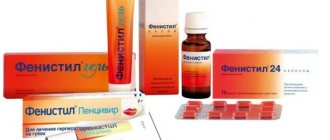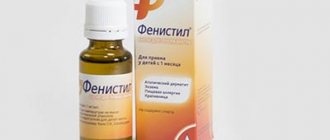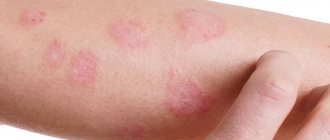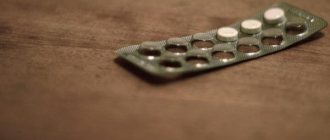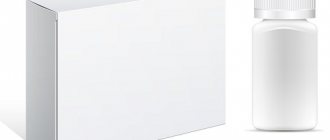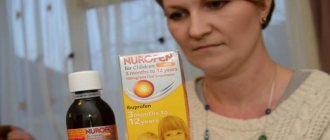The instructions for use of many medications indicate that they are prohibited from being taken during lactation. But it often happens that one or another medication is completely acceptable during breastfeeding, despite the instructions.
Fenistil is one of these drugs. Despite the fact that manufacturers do not recommend taking it during breastfeeding, doctors often prescribe it to nursing mothers to combat allergies. This is a drug with antihistamine effects. It goes on sale in several forms of release, each of which has its own nuances in use. Read more about this in our article.
Composition and release form
Dimetindene maleate is the active component of all dosage forms.
It is a non-selective histamine H1 receptor inhibitor. The dosage of the active substance in the packages is different. Depending on the method of application, the product exhibits local and systemic effects. Additional composition depends on the dosage form. Auxiliary components improve the absorption of the active component. A small tube contains a transparent substance. 100 g of gel contains 100 mg of the active ingredient. Excipients include propylene glycol, distilled water, carbopol, sodium hydroxide solution, benzalkonium chloride and ethylenediaminetetraacetic acid disodium salt. This topical remedy is suitable for children and adult patients.
The gel does not contain alcohol or dyes. The drug is quickly absorbed into the skin after application. Has a cooling effect.
The applicator package contains a translucent liquid substance. One gram of emulsion contains 1 mg of active substance. Excipients include benzalkonium chloride, phenylcarbinol, ionol, sodium hydroxide solution, propylene glycol, paraffin, cetostearomacrogol, carbopol, cocoyl caprylocaprate, water and disodium ethylenediaminetetraacetic acid. The emulsion is suitable for topical use.
It is a colorless, odorless liquid. One milliliter of medicine contains 1 mg of the active ingredient. Excipients include sodium hydrogen phosphate, propylene glycol, water, sodium saccharinate, citric acid monohydrate, bonzoic acid and ethylenediaminetetraacetic acid disodium salt. Drops are intended for oral administration.
Contraindications
An allergic reaction is the main indication. The product can be used to eliminate occasional manifestations of allergies and treat the disease. Symptomatic indications for the use of dimethindene maleate include skin redness, swelling and skin rash. The choice of dosage form of the drug should depend on the manifestations of the pathological condition and the characteristics of the medical history. It is recommended that you trust your doctor to prescribe the right medication. The specialist will conduct a diagnosis and clarify the cause of the complaints.
- Hives. The main symptom of this allergic disease is the appearance of red blisters on the skin, reminiscent of a burn. Skin changes are accompanied by itchy pain.
- Allergic rhinitis is an inflammation of the nasal mucosa of an immunological nature. Symptoms of the disease include nasal congestion, excess mucus production, and discomfort in the nasal passages.
- Hay fever. Symptoms of the pathology include redness of the conjunctiva of the eyes, weakness, runny nose and skin rashes. The attacks are seasonal.
- Allergic reaction to food and medications. This condition causes a variety of symptoms, including abdominal pain and skin rashes.
- Angioedema is an immunological disorder. Contact of integumentary tissues with an allergen is accompanied by swelling of the skin and mucous membranes.
- Diseases accompanied by itchy skin. These are different forms of dermatitis, eczema, rubella, measles and other diseases. Burning and itching also occur due to an insect bite.
- Reducing the risk of developing allergies as part of complex therapy of the underlying disease.
- Itchy pain in the skin area, developing against the background of eczema, insect bites, dermatitis, urticaria and other pathological conditions of an allergic nature.
- Burn of integumentary tissue due to excessive exposure to sunlight.
- Minor chemical burns of domestic or industrial origin.
Not all patients can take drops and apply topicals to the surface of the skin. Some diseases and conditions increase the risk of complications during drug therapy. The presence of any contraindication indicates the impossibility of using Fenistil.
- Hypersensitivity of the body to any component.
- Breast-feeding.
- Angle-closure glaucoma.
- Immunological inflammation of the bronchi (bronchial asthma).
- The child is up to one month old.
- First trimester of pregnancy.
- BPH.
- Angle-closure glaucoma.
- Hypersensitivity to any component.
- Prematurity and the age of the child up to one month.
- BPH.
The drug must be used strictly according to indications. If skin reactions and other unpleasant symptoms occur for the first time, it is recommended to visit a doctor before starting therapy. Dimetindene maleate is only suitable for symptomatic relief, so using a topical or oral medication will not permanently eliminate the problem. Symptoms of an allergic reaction may return a few hours after using the medicine.
- Patients aged from one month to twelve years. The daily dosage is determined by the child’s body weight. Two drops per kilogram. The received dose is divided into three doses per day.
- Patients over twelve years of age: from 60 to 120 drops per day. The daily dose should be divided into three single doses during the day.
- If drowsiness occurs during treatment, it is recommended to take drops before bed and in the morning.
The liquid is used for external treatment of affected surfaces. It is recommended to apply a small amount of emulsion or gel to the surface of the skin two to four times a day. If the patient suffers from extensive skin rashes and severe pain, a doctor should be consulted. The simultaneous use of topical and oral forms of the drug is possible.
- The use of drops enhances the therapeutic effect of drugs that depress the nervous system. These are tranquilizers, sleeping pills, antidepressants, anticonvulsants and other medications.
- Tricyclic antidepressants and m-anticholinergic blockers, when taken simultaneously with drops, increase the risk of increased intraocular pressure and urinary problems.
- If the patient is taking any medications, you should consult a doctor before using the drops.
- After treating the skin with a topical agent, exposure to sunlight should be avoided.
- The components of the gel and emulsion may cause irritation and symptoms of dermatitis.
- Do not treat large surface areas of skin in small children.
- Fenistil should not be taken together with procarbazine.
- Therapy in childhood increases the excitability of the nervous system.
- Drops can be added to baby food.
- The drug reduces the speed of psychomotor reactions. Driving during therapy should be done with caution.
Dimetindene is a direct analogue of the drug containing dimethindene maleate as an active ingredient. Available in the form of drops and gel.
Indirect analogues with other active ingredients:
- Advantan is a cream with antiallergic properties.
- Tavegil is an antihistamine.
- Claritin is an antiallergic drug in the form of tablets and syrup.
Analogue
Analogues with other active ingredients differ in contraindications, specific action and instructions.
Fenistil can be prescribed by a doctor in the following cases:
- for seasonal allergic conjunctivitis and rhinitis;
- with nettle fever;
- during the appearance of nutritional allergies;
- when eczema or dermatitis appears;
- with chicken pox;
- for allergic inflammation of the nasopharynx;
- if you have an allergic reaction to any medications, food, or drinks.
The drug, released in gel form, is also used for insect bites that cause swelling and severe itching.
Despite such a wide range of applications, the possibility of using Fenistil in each case must be discussed with your doctor in advance.
If the drug is used incorrectly, unpleasant symptoms occur:
- increased skin dryness;
- burning of the epidermis;
- itching of the skin or the appearance of a rash on it;
- drowsiness;
- headache;
- dry mouth;
- redness of the skin of the face;
- tachycardia;
- urinary retention;
- burning in the nasopharynx.
General side effects that may occur when taking Fenistil in any dosage form are indicated.
There are also situations when it is absolutely forbidden to use Fenistil:
- individual intolerance to one or more components of the product;
- first trimester of pregnancy;
- children's age less than one month;
- bronchial asthma;
- closed-type glaucoma;
- oncological diseases of the prostate gland.
Fenistil tablets should absolutely not be taken by women during breastfeeding. For other forms of release there are no such serious restrictions.
It is precisely because of such a large number of side effects and contraindications for use that it is imperative to consult a doctor before using this drug.
Most often, when treating allergies with this drug, women encounter disturbances in the gastrointestinal tract. Such situations are characterized by nausea, vomiting, and bowel dysfunction. Pathological manifestations of the stomach are not uncommon. One of the consequences of such therapy may be the occurrence of gastritis or stomach ulcers.
More rare side effects when using the drug include disorders of the heart and lungs. It is possible to develop tachycardia, nagging pain attacks in the heart area. The literature describes cases of prolonged shortness of breath during treatment with fenistil and even partial respiratory failure. A sharp drop in blood pressure can also be provoked by this medicine.
Although the drug is intended to relieve skin manifestations of allergies, in some patients it only aggravates the process. Areas of rashes and hyperemia may increase, and the intensity of burning and itching may increase.
If you have such symptoms, you should stop using this antihistamine and seek help from a specialist. Such recommendations are especially necessary for nursing women, since adverse reactions to taking the drug can occur not only in them, but also in children.
If the problem arises as to whether fenistil can be taken while breastfeeding, it should be borne in mind that there are no absolute contraindications for this medicine. Experts do not prescribe this drug to children under 1 month of age, to persons who have an individual intolerance to the drug, and to patients suffering from acute kidney pathology.
Nursing mothers are advised to use this medicine with great caution. The instructions prohibit the constant treatment of allergies with fenistil, however, for a single use this medicine is quite suitable. Of course, taking the drug should be under the constant supervision of a doctor.
Indications for use
Fenistil can be prescribed by a doctor in the following cases:
- for seasonal allergic conjunctivitis and rhinitis;
- with nettle fever;
- during the appearance of nutritional allergies;
- when eczema or dermatitis appears;
- with chicken pox;
- for allergic inflammation of the nasopharynx;
- if you have an allergic reaction to any medications, food, or drinks.
The drug, released in gel form, is also used for insect bites that cause swelling and severe itching.
Despite such a wide range of applications, the possibility of using Fenistil in each case must be discussed with your doctor in advance.
Drug interactions
Dimetindene maleate exhibits antihistamine, analgesic and anti-inflammatory properties. This chemical compound disrupts the interaction of histamine with cellular receptors, due to which the development of the immunological reaction stops. The drug does not eliminate the cause of allergy development and is suitable only for symptomatic therapy.
- Anti-inflammatory effect. Dimetindene maleate reduces vascular permeability, which is why inflammatory mediators stop getting into the tissues. The product reduces the severity of edema and eliminates redness of the integumentary tissue.
- Antipruritic effect. Skin itching due to an allergic reaction is caused by irritation of pain receptors. Alleviating the inflammatory process helps the patient get rid of the unpleasant symptom.
- Antibradykinin action. Bradykinin increases pain and negatively affects the condition of blood vessels during the inflammatory response. The drug inhibits the activity of this peptide.
- Analgesic effect. The anesthetic properties of the drug are due to the action of the active component and excipients.
- Anticholinergic properties. Strengthen the effectiveness of symptomatic therapy.
To enhance the therapeutic effect, Fenistil in gel form can be combined with Fenistil drops for oral administration.

In severe cases, with a severe allergic reaction, the use of the gel is combined with taking drugs from the group of glucocorticosteroids or hormonal ointments. There is no data available on any other interactions between Fenistil and medications, but if you are already taking antihistamine tablets, you should tell your doctor about this.
For allergies during pregnancy and breastfeeding
Any drug that penetrates the mother’s body also affects the child. When considering the effect of Fenistil on breast milk and the baby, it is necessary to take into account the form of release of this drug.
Fenistil is available in the following forms:
- The gel contacts only the top layer of a woman’s epidermis. It does not penetrate deep into the tissues, so its particles cannot get into the milk and do not in any way affect the health and well-being of the child.
- Drops for oral administration are quickly absorbed into the stomach and also quickly eliminated from the body.
Despite this, pediatricians and therapists advise taking them with caution. If there is an excess of the active substance in the mother’s body, it enters in excess into the milk and then into the child’s body. As a result, infants become more nervous and tearful. The taste and volume of milk itself do not change. - Fenistil capsules contain the highest concentration of active substances. These components do not affect the taste and volume of breast milk, but reduce the concentration of nutrients in it. In addition, they inhibit the functioning of the baby’s nervous system. As a result, his reactions become more inhibited and his actions slower.
When choosing Fenistil as an antihistamine, a breastfeeding woman must take into account these effects of the drug on her baby and milk.
The two main approaches to treating allergies in mothers during lactation are:
- preventing or reducing exposure to allergens;
- elimination or reduction of allergy symptoms.
The first involves measures related to changes in diet, living conditions and increased immunity. The latter usually affect the amount of histamine produced, which leads to a decrease in inflammatory processes. Therefore, most anti-allergy drugs are called antihistamines.
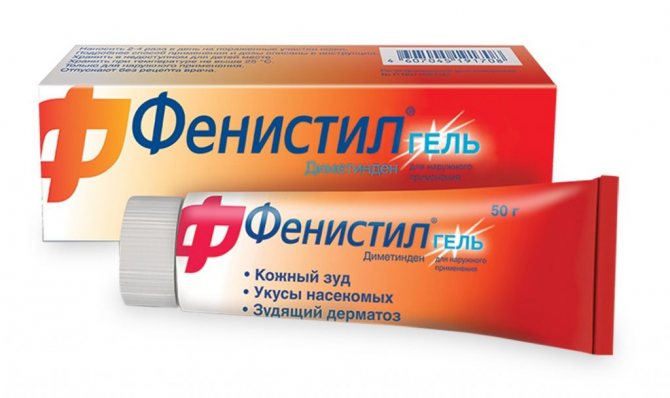
There are two main generations of antihistamines. Medicines developed several decades ago belong to the first generation. Their properties have been studied quite well. That's why they are also called classic. These antihistamines have a pronounced sedative (calming, hypnotic) effect.
More modern antihistamines do not cause drowsiness, and the side effects from their use are less pronounced. Therefore, second-generation products are recommended for nursing mothers.
Among the classic anti-allergy drugs that can be taken with caution by mothers during lactation are Suprastin (Chloropyramine), Diazolin (Mebhydrolin), Fenistil (Dimetindene).
According to the instructions and data from the European electronic directory, Suprastin should not be taken during breastfeeding. But in many textbooks and manuals in the CIS countries it is recommended for use in short courses (three to five days) in small doses. Suprastin is a fast-acting antihistamine.
According to the instructions, Diazolin is not allowed to be used during breastfeeding. It is recommended to interrupt breastfeeding. Taking the drug during lactation is possible only in cases of vital necessity with the permission of a doctor, in a minimum dose and for a short course, when other means are ineffective.
Fenistil, according to the European electronic directory, can be used with caution during lactation only in the form of cream and ointment. Other forms are considered risky. Fenistil, when applied to irritated skin, reduces itching and has a local anesthetic and cooling effect. The therapeutic effect begins to be felt in the first minutes and becomes maximum after two to three hours.
Fenistil gel is not recommended for women in the first trimester of pregnancy, since, although in small quantities, the active ingredient of the drug enters the systemic bloodstream and then through the placenta to the fetus. Data on the safety of the drug for the fetus are not provided.
In the second and third trimesters of pregnancy, the use of Fenistil externally is possible under the supervision of a physician, in the case where the expected benefit for the mother outweighs the potential risks for the unborn child.
The use of the drug Fenistil gel during breastfeeding is not prohibited, but a nursing mother should avoid applying the drug to the area of the areola and nipple to prevent the child from swallowing the medicine.
Medicines are considered the most effective ways to relieve allergy symptoms. Antihistamines are often used to treat many forms and manifestations of allergies. Their function is to inhibit the action of histamine, a substance formed as a result of an allergic reaction and causing the main symptoms of allergies.
Every woman who is breastfeeding, as well as anyone who is in an interesting position, is probably wondering: is it allowed to take antihistamines during pregnancy and lactation?
Antihistamines during pregnancy and breastfeeding are prescribed strictly under the supervision of a physician. There are no antihistamines that are absolutely safe for the fetus. Antihistamines are divided into three groups based on their effect on pregnancy.
One of the frequently used anti-allergy drugs is fenistil. It is available in the form of drops and gel. Drops are used internally for the manifestation of such types of allergies as urticaria, runny nose caused by flowering plants, for allergies caused by food and drugs, for edema. The gel is applied externally, directly to the site of skin lesions caused by various types of itching (urticaria, eczema, skin lesions from sun rays, insect bites).
The instructions for use state that during breastfeeding you should use fenistil extremely carefully and only after consultation with your doctor. The effectiveness of fenistil for allergies is achieved by containing fast-acting substances that quickly penetrate the blood. This means that the substances contained in this drug pass into breast milk.
And since the side effects include drowsiness and dizziness, it is better not to take it yourself, without consulting a doctor. If for an adult organism the proportion of these substances is considered normal, then for the developing organism of a newborn they can be dangerous and lead to disastrous consequences. First of all, there will be an impact on the baby’s nervous system.
Before using fenistil to treat allergies, you must consult with an allergist, who, after studying a blood test, assessing the degree of danger of the medicine, will give detailed advice and prescribe you treatment appropriate to your symptoms. Fenistil during lactation is prescribed by doctors as a last resort.
At the same time, it is strongly advised to stop breastfeeding the baby in order to avoid the substances contained in the drug entering the child’s body through milk. You need to know your body and familiarize yourself with a number of side effects that fenistil can cause. Do not self-medicate and do not listen to friends.
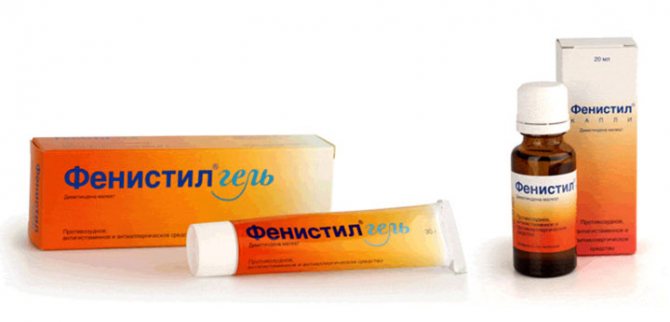
Unfortunately, today there are no antihistamines that are fully approved for use during lactation and pregnancy. This is due to the lack of necessary experiments on these drugs in humans during lactation and pregnancy. A drug can be prescribed only if the potential benefit from its use justifies its unsafety for the fetus.
Fenistil during breastfeeding – Health Prosto Medical Center in Yekaterinburg
Allergies in a nursing mother are a common and unpleasant occurrence; they occur for various reasons. Allergic manifestations in the form of rash, itching, runny nose, swelling, worsen the well-being of a lactating woman. The newborn senses the mother’s mood and, in turn, begins to act up and cry. How to eliminate the symptoms and not harm the baby?
Fenistil is a first generation antihistamine that eliminates the main symptoms of allergies. Description of dosage forms of the drug, indications, contraindications, features of use during lactation - more on this below.
Composition and dosage form
Fenistil is a non-selective histamine blocker; the drug is used to eliminate signs of allergies, and not to treat its cause. According to the instructions, the medication is prohibited during lactation.
- There are 3 dosage forms of the drug: drops, gel and tablets.
- Composition of the drops: dimethindene, propylene glycol, saccharin, food additive E210.
- Gel composition: dimethindene, propylene glycol, carbopol 974R.
- Capsule composition: dimethindene, milk sugar, starch, 2-aminopentanedioic acid, silicone emulsion, titanium dioxide, gelatin.
The drops are packaged in glass bottles with a sprayer, the gel in tubes, and the capsules in blisters.
The principle of action of the drug is as follows: when reacting with a pathogen, histamine (a hormone, a mediator of an immediate allergic reaction) is activated, the active components block it, due to this the hormone does not have time to transmit the signal to the cells, and biologically active substances are not released. As a result, typical symptoms such as itching, redness, rash and swelling are absent.
Thus, Fenistil blocks histamine, which continues to be released, but the hormone is no longer able to cause an allergic reaction. That is why the drug affects only the symptoms and not the causes of allergies. The components of the antihistamine reduce the degree of permeability of the capillary walls, and therefore the liquid does not leak into the tissue and there is no swelling.
Indications
Fenistil in the form of drops and capsules is used for the following diseases:
- nettle fever;
- seasonal allergic conjunctivitis;
- allergic inflammation of the nasal mucosa and nasopharynx;
- nutritional allergy;
- allergic reaction due to taking medications;
- angioedema;
- itching due to eczema, chicken pox, rubella measles, bee bites, mosquito bites, dermatitis, etc.).
Drops and tablets are used to prevent allergies, as one of the components of complex hyposensitizing treatment.
The gel is used to eliminate skin itching of various origins: dermatoses, nettle fever, chickenpox, measles. This list can be supplemented with itching due to the bite of wasps, mosquitoes, bees, and thermal burns. Read more about what to do if you are bitten by insects here.
Method of application and dosage
Fenistil drops are used for allergies in the following dosage:
- patients from 1 month - no more than 10 drops three times;
- from 12 months to 3 years – 15 drops three times a day;
- from 4 to 13 years – 20 drops three times;
- patients over 13 years old, 30–40 drops 3 times a day.
Drops for a newborn can be mixed with breast milk.
This dosage form causes drowsiness.
The dosage of capsules for patients over 13 years of age is 1 tablet once a day, since the drug is effective for 24 hours. Take your medicine before bed. The tablet does not need to be chewed; after swallowing, wash it down with water. The therapeutic course lasts 25 days.
The gel is applied to the affected skin no more than 4 times in 24 hours. Lubricate the skin with a thin ball, protect this area from exposure to ultraviolet radiation. If the itching is severe and the rash is extensive, then it is allowed to use gel and drops together.
Contraindications and side effects
Fenistil has the following contraindications:
- hypersensitivity to the components of the drug;
- closed-angle type of glaucoma (for internal use);
- change in frequency of urination;
- infants up to 1 month.
Gel should not be used to treat bleeding wounds or overly irritated skin.
The medicine is used carefully during breastfeeding and only under the supervision of the attending physician.
The antihistamine has the following side effects: increased heart rate, mental disorders, involuntary muscle contractions, xerostomia.
This list can be supplemented by temperature fluctuations, urinary retention, and a sharp decrease in blood pressure.
Such conditions are extremely rare, only as a result of improper use or an unreasonable increase in dosage.
Side effects from the gastrointestinal tract are possible in the form of attacks of vomiting, painful sensations in the stomach, exacerbation of peptic ulcers. Possible disturbances in the functioning of the respiratory system: temporary cessation of breathing at night in patients under 12 months of age, tightness in the chest, shortness of breath. As a result of improper use of the gel, rash, peeling, burning and itching occur.
For shortness of breath and obstructive expiratory disorders, due to chronic inflammation of the bronchi and emphysema, antihistamines should only be taken under medical supervision.
Fenistil during breastfeeding
Treatment of allergies involves the implementation of 3 points: elimination of allergy pathogens, relief of symptoms, and reduction of antibody production.
However, this treatment regimen does not work when breastfeeding, since many antihistamines are prohibited from taking. Read more about antihistamines and their action in the article at the link https://vskormi.ru/mama/if-the-mother-is-sick/ot-allergii-pri-grudnom-vscarmlivanii/.
Some doctors believe that Fenistil is a safe antihistamine that can be used to treat even newborns. Thanks to the active substances, the drug perfectly helps to cure eczema, bee and mosquito bites, eliminates itching, excessive tear production and swelling.
Opponents of the drug believe that it is prohibited to use during lactation. This is explained by the fact that the effect of the drug components on a newborn has not been studied. And the concentration of active substances in mother's milk is unknown. According to opponents, the medication can be taken once if the mother experiences life-threatening symptoms (angioedema).
Despite this, the drug is prescribed to lactating women. If a nursing mother has an acute allergic reaction, the course of treatment is no more than 10 days, this is enough to relieve the symptoms. If symptoms disappear earlier, stop taking the drug.
Thus, Fenistil is allowed to be used by lactating women, but only after a doctor’s prescription. A nursing mother must follow the dosage and frequency of administration determined by the doctor after research.
data-matched-content-rows-num=”9, 3″ data-matched-content-columns-num=”1, 2″ data-matched-content-ui-type=”image_stacked”
Source:
Is it permissible to use Fenistil while breastfeeding?
The instructions for use of many medications indicate that they are prohibited from being taken during lactation. But it often happens that one or another medication is completely acceptable during breastfeeding, despite the instructions.
Fenistil is one of these drugs. Despite the fact that manufacturers do not recommend taking it during breastfeeding, doctors often prescribe it to nursing mothers to combat allergies. This is a drug with antihistamine effects. It goes on sale in several forms of release, each of which has its own nuances in use. Read more about this in our article.
Hide content
Can it be used for breastfeeding?
- Throughout the entire period of breastfeeding, a young mother should choose and take any medications with special care.
- Otherwise, she can cause significant harm not only to herself, but also to the health of her child.
- This antihistamine is allowed to be used by a woman during lactation, but only in certain release forms and strictly observing the dosage.
Indications for use
Fenistil can be prescribed by a doctor in the following cases:
- for seasonal allergic conjunctivitis and rhinitis;
- with nettle fever;
- during the appearance of nutritional allergies;
- when eczema or dermatitis appears;
- with chicken pox;
- for allergic inflammation of the nasopharynx;
- if you have an allergic reaction to any medications, food, or drinks.
The drug, released in gel form, is also used for insect bites that cause swelling and severe itching.
Despite such a wide range of applications, the possibility of using Fenistil in each case must be discussed with your doctor in advance.
Contraindications and side effects
If the drug is used incorrectly, unpleasant symptoms occur:
- increased skin dryness;
- burning of the epidermis;
- itching of the skin or the appearance of a rash on it;
- drowsiness;
- headache;
- dry mouth;
- redness of the skin of the face;
- tachycardia;
- urinary retention;
- burning in the nasopharynx.
General side effects that may occur when taking Fenistil in any dosage form are indicated.
There are also situations when it is absolutely forbidden to use Fenistil:
- individual intolerance to one or more components of the product;
- first trimester of pregnancy;
- children's age less than one month;
- bronchial asthma;
- closed-type glaucoma;
- oncological diseases of the prostate gland.
Fenistil tablets should absolutely not be taken by women during breastfeeding. For other forms of release there are no such serious restrictions.
It is precisely because of such a large number of side effects and contraindications for use that it is imperative to consult a doctor before using this drug.
Any drug that penetrates the mother’s body also affects the child . When considering the effect of Fenistil on breast milk and the baby, it is necessary to take into account the form of release of this drug.
Fenistil is available in the following forms:
- The gel contacts only the top layer of a woman’s epidermis. It does not penetrate deep into the tissues, so its particles cannot get into the milk and do not in any way affect the health and well-being of the child.
- Drops for oral administration are quickly absorbed into the stomach and also quickly eliminated from the body. Despite this, pediatricians and therapists advise taking them with caution.
If there is an excess of the active substance in the mother’s body, it enters in excess into the milk and then into the child’s body.As a result, infants become more nervous and tearful. The taste and volume of milk itself do not change.
- Fenistil capsules contain the highest concentration of active substances. These components do not affect the taste and volume of breast milk, but reduce the concentration of nutrients in it. In addition, they inhibit the functioning of the baby’s nervous system. As a result, his reactions become more inhibited and his actions slower.
When choosing Fenistil as an antihistamine, a breastfeeding woman must take into account these effects of the drug on her baby and milk.
Recommendations for mothers
Young mothers should definitely consult a specialist before using this drug. The doctor must assess the potential risk to her and her baby's health, and determine the correct dosage and duration of treatment.
A nursing mother must follow the indicated dosage and time of taking Fenistil. Under no circumstances should you violate medical orders .
Dosage forms: drops, gel, capsules
Women during lactation are allowed to use Fenistil in the following forms of release:
- drops for oral administration;
- gel for external use.
If a woman has been prescribed capsules for oral administration, then it is necessary to transfer the child to artificial feeding. Although in such situations, it is better to use Fenistil analogues.
Acceptable dosages
- Fenistil gel can be used by women during lactation 3-4 times a day. The product is applied to the affected area of the epidermis in a thin layer. The product can also be used in infants, the maximum number of applications is 2 within 24 hours.
- Fenistil in liquid form can be taken orally up to 150 drops per day. In this case, it is better to divide their intake into 2-3 times with equal time intervals between uses. Your pediatrician will tell you how to give drops to a baby on breastfeeding. Standard recommendations: twice a day, 10 drops.
- Fenistil capsules should absolutely not be given to infants. They are also not recommended for women who are breastfeeding. If lactation is stopped while taking it, then take 1 tablet before going to bed.
Source: https://zdorovie-prosto.ru/psoriaz/fenistil-pri-grudnom-vskarmlivanii.html
Adverse reactions
Medicinal substances act not only on damaged tissues. The components of any drug can penetrate other anatomical structures and cause undesirable effects. Antihistamines can also cause allergies if the patient's immune system is sensitive to the active or auxiliary component.
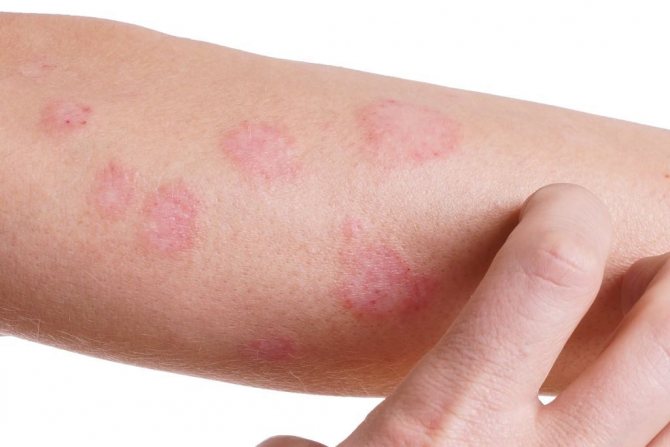
Skin rashes may be a side effect
- Swelling in the facial area.
- Muscle tension (spasms).
- Breathing problems.
- Acute immunological reactions.
- Fatigue and drowsiness.
- Nausea and vomiting.
- Stomach ache.
- Loose stools.
- Dry mucous membranes.
- Headache and dizziness.
- Irritability and anxiety.
- Dry skin.
- Skin rashes, itching.
- Burning skin.
Recommendations for mothers
Young mothers should definitely consult a specialist before using this drug. The doctor must assess the potential risk to her and her baby's health, and determine the correct dosage and duration of treatment.
A nursing mother must follow the indicated dosage and time of taking Fenistil. Under no circumstances should you violate medical orders.
Women during lactation are allowed to use Fenistil in the following forms of release:
- drops for oral administration;
- gel for external use.
If a woman has been prescribed capsules for oral administration, then it is necessary to transfer the child to artificial feeding. Although in such situations, it is better to use Fenistil analogues.
All doctors agree that breastfeeding should not be interrupted if a nursing mother has allergies. There is evidence that histamine can pass into breast milk in small quantities, but it does not have any effect on the baby’s sensitivity to allergens. It is believed that predisposition to allergies in most cases depends on heredity.
If the mother takes medications to relieve painful manifestations, then it is necessary to carefully monitor the baby’s reaction. If a child develops skin rashes, disturbances in the gastrointestinal tract, or pain, you should stop taking the medication and consult a doctor again.
Directions for use and doses
Fenistil capsules must be swallowed whole; chewing them is prohibited. Be sure to take the medicine with enough water.
| Release form | Children | Adults |
| Gel and emulsion | Apply locally to affected skin areas 2 to 4 times a day. In the presence of accompanying itching, it is recommended to simultaneously use Fenistil capsules for oral use to enhance the therapeutic effect. | |
| Capsules | From 12 years old, 1 capsule (4 milligrams) 1 time per day. In severe cases, it is allowed to increase the frequency of doses of the drug up to 3 times a day. The dosage remains the same and cannot be increased. | |
| Syrup | From 1 to 12 months, take from 3 to 10 drops 3 times a day. From 1 to 3 years, 10-15 drops 3 times a day. After 3 years, 15-20 drops 3 times a day. After 12 years, 20-40 drops 3 times a day. | 20-40 drops 3 times a day. |
Is it possible to breastfeed if your mother has allergies?
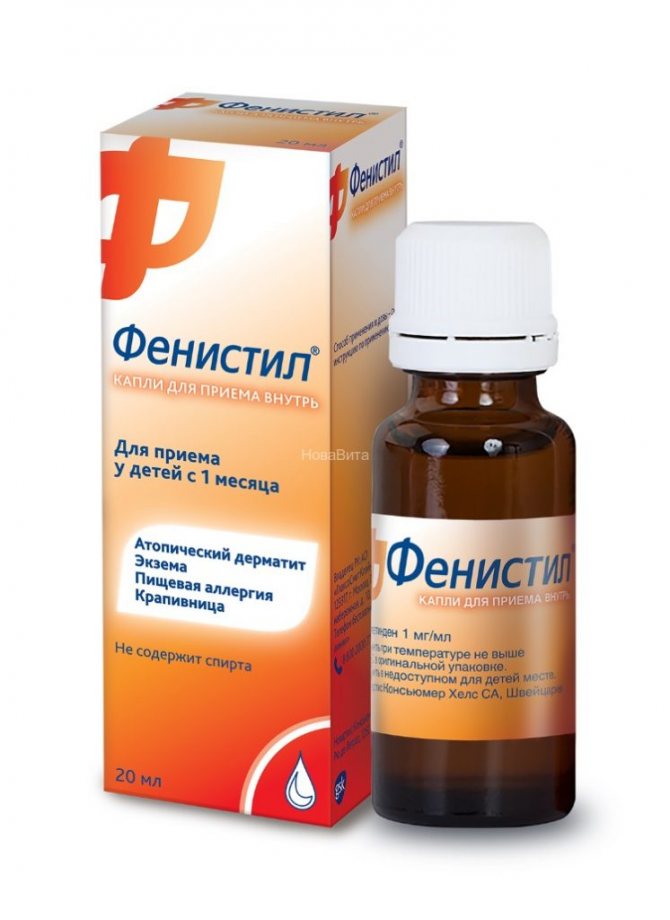
When the first symptoms appear, a young mother should consult a doctor. The longer you delay the start of treatment, the more effort the therapy will require.
First of all, you need advice from an allergist. It will help determine the cause of the pathological reaction in a woman. Because without removing the allergen from the environment, treatment becomes meaningless.
Modern pharmacology offers the fair sex a large selection of medications that can be used during lactation. It should be noted that, unlike fenistil, these are mainly second-generation antihistamines:
- Most often, experts recommend to their patients medications based on piperazine. These are the drugs “Cetrin” and “Letizen”. There is no indication in the literature of possible pathological reactions on the part of children to them.
- Medicines “Aldecin” and “Erius” have proven themselves well for relieving allergy attacks. These medications are recognized worldwide as approved for women during lactation.
- The well-known drugs Loratadine and Clarotadine can also be successfully used to treat allergies during breastfeeding. They do not dissolve well in milk, so they do not pose a threat to the baby’s health.
Antihistamine medications differ in their components and price, but in any case, their use is possible only after the advice of a doctor.
Is the drug "Fenistil" allowed during breastfeeding?
Pregnancy, childbirth and lactation are accompanied by changes in hormonal levels and a decrease in immune defenses for any woman. Allergy can be a fairly common pathology in a young mother, to combat which many patients use fenistil while breastfeeding.
Any antihistamine should be used with great caution during breastfeeding, and this drug is no exception. The abstract prohibits prescribing an antihistamine during lactation, but many experts do not agree with such recommendations.
Why are pediatricians against fenistil?
Pharmacologists classify the drug in question as a first-generation histamine hormone deactivator. It is known that at the first symptoms of an allergic reaction in the human body, a sharp release of this substance occurs, which leads to the formation of swelling, skin redness and other manifestations of allergies.
A young woman may complain of a runny nose, swelling of the nasopharyngeal mucosa, and skin rash. All this is a consequence of the action of active substances released from cells under the influence of histamine.
Fenistil blocks the action of the hormone, increases the density of the walls of blood vessels and capillaries, which leads to the relief of edema. The likelihood of developing an immediate allergy is sharply reduced.
Since the drug does not reduce the amount of hormone released, but only prevents its direct effect on the female body, we can conclude that this medicine is intended to relieve the main symptoms of allergies. It is not suitable for combating the causes of such pathology.
When a young mother uses fenistil to relieve an allergic condition while breastfeeding, the instructions for the drug categorically do not recommend such treatment for the woman. Pharmacologists attribute this ban to the lack of clinical data and laboratory studies on the effect of the drug on the child’s body.
In addition, there is no information in the medical literature about the rate of accumulation of the drug in the blood and, accordingly, in a woman’s breast milk. Most pediatricians do not advise using this drug for long-term treatment of allergies, but have nothing against the use of an antihistamine as an emergency drug.
When is it prescribed?
Like most non-selective histamine blockers, the medicine in question is used to relieve acute allergy symptoms. Most often, the remedy is prescribed for the following conditions:
- This is swelling and inflammation of the nasopharyngeal mucosa associated with a viral infection or seasonal exacerbation against the background of flowering plants that cause allergies.
- Conjunctivitis and similar inflammations of the eye mucosa that have an allergic basis.
- The reaction of a nursing woman’s body to mosquito bites and other insects. This drug helps well with allergies to bee stings.
- The drug is recommended by doctors for use in various viral skin pathologies, such as rubella, measles, and chickenpox.
- The medicine can help a woman when tissue swelling occurs due to neurological diseases.
- There are recommendations for the use of this drug for the treatment of burns of various etiologies.
The mechanism of action of an antihistamine drug depends on the dosage form. Its effect on the female body can be both general and local.
Recommendations for use
In the pharmacy chain this medicine is presented in several dosage forms. The dosage of the drug depends on the method of its use.
Anti-allergy drops
When a nursing mother uses fenistil to relieve allergy symptoms, drops during breastfeeding are the most convenient form of treatment. Experts explain this statement by the possibility of using this medicine not only by the woman herself, but also by her child.
The drops include two medicinal components: propylene glycol and dimethindene. It is these substances that take an active part in blocking the effects of the hormone histamine on the body.
The number of drops prescribed depends on age. If they begin to be given to infants from 1 month of life, 10 drops 3 times a day, then after the child reaches three years of age, the dosage is increased by 50%. Adult patients can afford up to 150 drops of the drug per day, divided into several doses.
By the way, the very fact that fenistil is prescribed to small patients indicates an overly strict attitude towards this drug during lactation. A nursing mother usually puts drops into her baby's breast milk to make it easier for the baby to take the medicine. It should be borne in mind that, like most antihistamines, the drug in question may increase the desire to sleep.
Watch the video about allergies in children:
Gel for treatment
The composition of this dosage form differs from drops only in binders and therefore has a mainly local effect. It is used for various types of urticaria, eczema, and allergic dermatitis.
It is recommended to apply a thin layer of medicinal ointment to the affected area 2-3 times a day and massage until completely absorbed. But if the patient has skin ulcers or open wounds, this remedy should not be used.
Experts advise combining fenistil gel during breastfeeding with internal drops. This will reduce the concentration of the antihistamine in the mother's blood and reduce the likelihood of a large amount of the drug passing into breast milk.
Capsules for relief of allergic manifestations
This dosage form is approved for use from 14 years of age. This is explained by the increased content of biologically active substances.
The regimen for using the drug is quite simple. The medicine is prescribed 1 capsule before bedtime, since the duration of the effect of this form on the body lasts a day.
Fenistil capsules are used for long-term use. Usually the treatment period is 2 - 3 weeks. It is the increased content of antihistamine complexes and the time of use that explains the ban on this form of the drug during breastfeeding.
Side effects and contraindications when taking
Most often, when treating allergies with this drug, women encounter disturbances in the gastrointestinal tract. Such situations are characterized by nausea, vomiting, and bowel dysfunction. Pathological manifestations of the stomach are not uncommon. One of the consequences of such therapy may be the occurrence of gastritis or stomach ulcers.
More rare side effects when using the drug include disorders of the heart and lungs. It is possible to develop tachycardia, nagging pain attacks in the heart area. The literature describes cases of prolonged shortness of breath during treatment with fenistil and even partial respiratory failure. A sharp drop in blood pressure can also be provoked by this medicine.
Although the drug is intended to relieve skin manifestations of allergies, in some patients it only aggravates the process. Areas of rashes and hyperemia may increase, and the intensity of burning and itching may increase.
If you have such symptoms, you should stop using this antihistamine and seek help from a specialist. Such recommendations are especially necessary for nursing women, since adverse reactions to taking the drug can occur not only in them, but also in children.
If the problem arises as to whether fenistil can be taken while breastfeeding, it should be borne in mind that there are no absolute contraindications for this medicine. Experts do not prescribe this drug to children under 1 month of age, to persons who have an individual intolerance to the drug, and to patients suffering from acute kidney pathology.
Nursing mothers are advised to use this medicine with great caution. The instructions prohibit the constant treatment of allergies with fenistil, however, for a single use this medicine is quite suitable. Of course, taking the drug should be under the constant supervision of a doctor.
Some useful tips for using the medicine
Most experts agree that, despite the prohibition in the instructions, taking the medicine is quite possible. Many pediatricians prescribe it for local treatment of the effects of insect bites and various local allergic manifestations. All this applies to the gel form of the drug.
The answer to whether fenistil drops can be taken while breastfeeding will be answered positively by most doctors. The only condition is constant monitoring by specialists and the duration of the course of treatment.
It is recommended not to carry out antiallergic therapy with this medicine for longer than 9 to 10 days. Usually this period is enough to solve the problem. Women are not advised to try to consolidate the results obtained. If allergy symptoms disappear earlier, you should stop taking the medication.
Pediatricians insist on continuing breastfeeding even during the period of allergy treatment with fenistil. Such advice is explained by the fact that the mother’s antibodies will help the baby counteract external harmful factors.
What else can you do to stop an allergy attack in a nursing woman?
When the first symptoms appear, a young mother should consult a doctor. The longer you delay the start of treatment, the more effort the therapy will require.
First of all, you need advice from an allergist. It will help determine the cause of the pathological reaction in a woman. Because without removing the allergen from the environment, treatment becomes meaningless.
Medications
Modern pharmacology offers the fair sex a large selection of medications that can be used during lactation. It should be noted that, unlike fenistil, these are mainly second-generation antihistamines:
- Most often, experts recommend to their patients medications based on piperazine. These are the drugs “Cetrin” and “Letizen”. There is no indication in the literature of possible pathological reactions on the part of children to them.
- Medicines “Aldecin” and “Erius” have proven themselves well for relieving allergy attacks. These medications are recognized worldwide as approved for women during lactation.
- The well-known drugs Loratadine and Clarotadine can also be successfully used to treat allergies during breastfeeding. They do not dissolve well in milk, so they do not pose a threat to the baby’s health.
Antihistamine medications differ in their components and price, but in any case, their use is possible only after the advice of a doctor.
Tidy home as a way to prevent allergies
A few tips on how to protect yourself from developing allergic reactions during lactation:
- To reduce the likelihood of attacks, it is recommended to completely abandon the use of chemical reagents in everyday life. Any detergents, shampoos, gels and aerosols can provoke an acute attack of allergies in the patient.
- There should be no objects in the young mother's room that can provoke such attacks. Most often, allergies are caused by ordinary dust. Therefore, heavy curtains, bulky upholstered furniture, and books should be removed from the room as much as possible.
- Pets can also cause an allergic reaction in a woman. Dogs and cats often provoke fur attacks, and indoor plants can become a source of mold, which can lead to the development of allergies.
- To combat this pathology, there are special diets. A woman is advised to limit herself, remove sweets and fresh white bread from her diet. Preference should be given to foods low in carbohydrates. It is very important to drink a lot.
Allergies in a young mother during lactation are quite a serious problem. If you do not seek help from specialists in time, a similar pathology may occur in your baby.
Source: https://GrudInfo.ru/fenistil-pri-grudnom-vskarmlivanii/
Doctor Komarovsky's opinion
Famous pediatrician O.E. Komarovsky insists that antihistamines should only be prescribed by a doctor, and should only be taken in the dosage prescribed by the doctor. In most cases, these remedies cannot completely eliminate painful symptoms. But the right drug can significantly improve the quality of life.
Komarovsky believes that it is inappropriate to use antihistamines for more than seven days. There is evidence that such treatment itself can cause allergies. If necessary, it is optimal to take one medicine for five to six days, and then another for the same amount of time. The doctor reminds that you cannot be treated with antibiotics that cause allergies, and at the same time take antihistamines for it.
Use during pregnancy and lactation
Most experts agree that, despite the prohibition in the instructions, taking the medicine is quite possible. Many pediatricians prescribe it for local treatment of the effects of insect bites and various local allergic manifestations. All this applies to the gel form of the drug.
The answer to whether fenistil drops can be taken while breastfeeding will be answered positively by most doctors. The only condition is constant monitoring by specialists and the duration of the course of treatment.
It is recommended not to carry out antiallergic therapy with this medicine for longer than 9 to 10 days. Usually this period is enough to solve the problem. Women are not advised to try to consolidate the results obtained. If allergy symptoms disappear earlier, you should stop taking the medication.
Pediatricians insist on continuing breastfeeding even during the period of allergy treatment with fenistil. Such advice is explained by the fact that the mother’s antibodies will help the baby counteract external harmful factors.
"Fenistil" during pregnancy - gel, drops and ointment, is it possible in different trimesters
Pregnancy for the female body is a period of large-scale hormonal changes and physiological changes. Therefore, the list of diseases that can manifest themselves in an expectant mother due to such changes is quite large. And in the time remaining before giving birth, you can get sick from several of them at once.
These include specific allergies, which manifest themselves as itching all over the body. Like most other such manifestations, it disappears on its own within the next 2-3 months after the baby is born.
And it can happen, including in women who have never previously suffered from immune disorders.
The situation is complicated by the fact that most medications are poorly compatible with the health of the fetus, or even incompatible with it at all. This also applies to immunosuppressants - allergy medications.
It is very rare to find a drug among them that can be taken during pregnancy, even as a last resort.
But those who have experienced this type of allergy claim that they still have to look for a way out, because the unbearable itching with it can drive you crazy, not just in months, but in a matter of days.
Is it possible or not?
To allow a medicine to be marketed, there is no requirement for studies of its safety during pregnancy and lactation. Some manufacturers conduct such tests on their own initiative, but they are quite expensive. In addition, if they are carried out, then only on adults or children.
Breast milk is simply not studied in such cases. This means that the amount of drug substances that have penetrated into it and the effect on the infant’s body are unknown. The instructions may indicate that the medicine can be taken from the first months of the baby’s life. But with hepatitis B it is contraindicated.
This may mean that the necessary research has not been carried out.
https://www.youtube.com/watch?v=1RBmN-XUPzw
Now many independent organizations are conducting independent studies on the compatibility of various drugs with hepatitis B, including Fenistil. According to the conclusions of these trials, it turns out that many illicit drugs can still be taken during lactation. You can find out their list in specialized reference books.
How to take Fenistil during pregnancy in the 1st, 2nd, 3rd trimester, reviews
Fenistil in the first trimester of pregnancy
As already mentioned, Fenistil is approved for expectant mothers. In order for its use to be safe, it is advisable to avoid oral forms and correlate the medication with the duration of pregnancy - the features of its effect are quite different.
The first trimester (up to week 12) is a contraindication for taking any form of Fenistil.
Read: What to do if you have diarrhea during your period
For severe allergic manifestations, the use of a gel or emulsion is allowed. Drops are used only as a last resort, when the benefit to the mother is greater than the risk to the fetus.
The use of capsules is strictly prohibited - they are not more effective than drops, but are more dangerous for the unborn baby.
In the second trimester (13-24 weeks) it is permissible to use external forms of the drug. They should be used strictly according to the instructions; you must not violate them - this can have a bad effect on the health of the unborn baby.
The optimal number of applications is 2 per day. Drops are used for severe allergic reactions, based on the same rule that the benefit must outweigh the risk. Capsules are strictly not recommended.
By the third trimester (after 24 weeks), the rules for using the drug do not change - it must be used strictly according to indications and in accordance with the instructions. The gel should not be applied to large areas of skin. In addition, the rule that the affected areas should not be exposed to ultraviolet rays should be strictly observed.
After the birth of a baby, it is undesirable to use Fenistil during lactation, especially in oral forms. If indicated, you can apply a gel or emulsion, but in no case should you treat nipples with them - this will negatively affect the baby’s health. If there is a need for treatment with Fenistil, you can interrupt lactation and transfer the baby to artificial feeding.
Application
Fenistil is available in two forms:
Drops are most often prescribed for food allergies, as well as an allergic reaction to flowering. The gel can be used to treat hives, rashes, and insect bites.
Doctors recommend taking this drug during lactation for the following diseases:
- allergic rhinitis;
- hives;
- food allergies;
- skin itching;
- eczema;
- atopic dermatitis;
- measles;
- insect bites;
- chicken pox.
A nursing mother should not use Fenistil drops or gel on her own. Only a doctor can prescribe the correct dosage.
Thanks to the active substances that make up this drug, its effect can be felt very quickly. However, despite the high effectiveness of this drug, there is the possibility of a negative reaction from the body of an infant. Therefore, it is very important to monitor his condition when taking Fenistil.
Instructions for Fenistil drops
Trade name: Fenistil®
Formula: 2-(2-dimethylaminoethyl)[2-(2-pyridyl)ethyl]-(1H)-indene maleate
Description: The drug is a transparent liquid, colorless and odorless.
Release form
The medicine is poured into 20 ml bottles of tinted glass, which are equipped with a polypropylene cap, which in turn is equipped with a system that controls the first opening.
Each bottle has a dropper dispenser and, accompanied by instructions for use, is packaged in a personal cardboard package.
Composition of Fenistil
The active substance of Fenistil drops is dimethindene maleate. One milliliter of the finished product contains one milligram of it, supplemented with inactive substances: non-crystallized aqueous sorbitol, sodium dihydrogen phosphate dihydrate, methyl parahydroxybenzoate, 96% ethanol and pure water.
Storage conditions
The bottle of products should be stored in its cardboard packaging in a place inaccessible to children.
The room temperature does not have to exceed 30 degrees.
Best before date
The product can be used within 3 years from the date of production. It is not recommended to use it after the expiration date.
Pharmacology
The drug Fenistil is an antihistamine, antiallergic, and antipruritic agent.
Being a blocker of H1-histamine receptors, it acts as a competitive histamine antagonist.
By its action, the product is able to reduce increased capillary permeability, which is associated with an allergic reaction.
Source: https://hospital-korea.ru/preparaty/fenistil-kapli-pri-beremennosti.html
Overdose
Cases of drug overdose have not been described, however, in order to avoid the development of negative reactions, you should avoid applying the gel to large areas of the skin, especially when used in pediatric practice.
If the gel is accidentally swallowed in large quantities, the patient must immediately induce vomiting, rinse the stomach and allow activated carbon tablets or any other sorbent to be taken orally. In case of development of diarrhea and severe vomiting, the patient is given symptomatic treatment.
